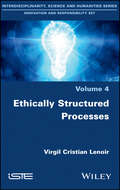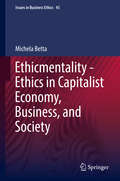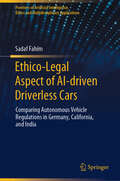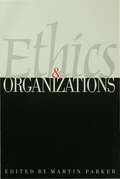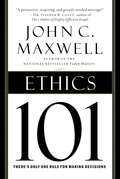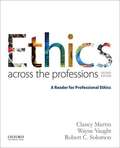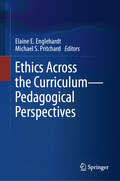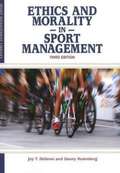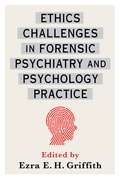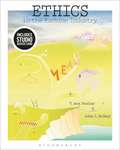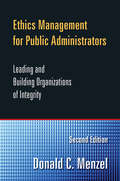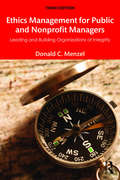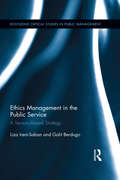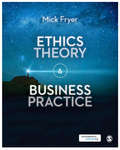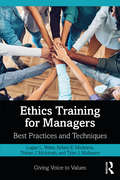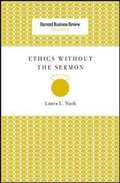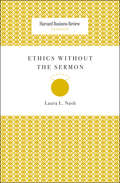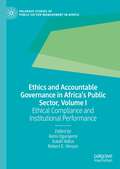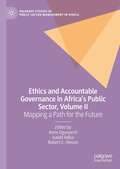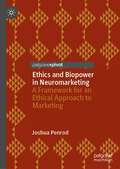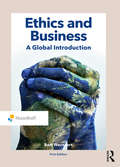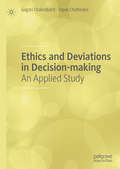- Table View
- List View
Ethically Structured Processes: Thinking World-scale Responsibility
by Virgil Cristian LenoirResearch and innovation involve knowledge in the form of effective "processes". These radically alter the relationship of men to the world and to other men. How to manage this effectiveness responsibly? The idea is to examine various possible structurations of such processes, in order to identify efficient processes that are ethical by their structure alone. The responsibility would then be to choose to achieve such objectives, instead of another that would be ethically indifferent. These achievements are tested on what appears as an extremely powerful economic dogma: the Invisible Hand. Demystifying this, by attacking what is considered its strong point, the idea of a "balance" associated with that of pure and perfect competition, and that of a Pareto-optimality attainable by this equilibrium, assumes all its Meaning if one proposes, against this neutral trial, an ethically structured process.
Ethicmentality - Ethics in Capitalist Economy, Business, and Society
by Michela BettaEthicmentality is an innovative book. It blends ethics withmentality to capture the interdependence of ethical life and social lifecreatively. The book is also innovative because of the way this interdependenceis explored. By focusing on practical ethical behavior in today's economy,business, and society, Michela Betta has advanced an understanding of ethics freedfrom the burden of moral theory. By introducing a new type of analysis thisbook also contributes to methodological innovation. Familiar issues are revisitedthrough the notion of ethicmentality. Capitalist economy is presented in termsof a mentality embedded in society, culture, and politics. Government is revealedas mentality about how to govern economically through market freedom ratherthan human rights. The rise of the financial economy is described aschallenging the traditional capitalist mentality of equal opportunities. Amoney mentality around debts and owing is perceived as having replaced credit andowning, and the rise of corporation managers as having destroyed the oldmentality of ownership. Ethicmentality shows the potential of constructive critique from economic, business, andsociety perspectives. It also breaches traditional limits by developing the ideaof ethical capital and entrepreneurial ethics. Ethical thinking is infused withthe Aristotelian notion of virtues and moderation to reflect about modern work. Ethicmentality helps us see thecomplexity of social and personal life. Given the pervasive nature of mentalityand ethics' focus on individual deliberation, ethicmentality represents their productivecombination, a new blend for ethical and social analysis.
Ethico-Legal Aspect of AI-driven Driverless Cars: Comparing Autonomous Vehicle Regulations in Germany, California, and India (Frontiers of Artificial Intelligence, Ethics and Multidisciplinary Applications)
by Sadaf FahimThis book is a comparative study of the laws and regulations involving legal and ethical issues related to Artificial Intelligence (AI), in particular for self-driving cars or autonomous vehicles (AVs). It identifies, analyzes, and points out such issues via a study of laws and regulations in India, Germany, and California, determining the legal liabilities of designer, developer/programmer, manufacturer, producer, users, or AI in the case of AVs. AV technology is being touted as one that is poised to bring revolution in the mobility ecosystem by lessening the number of accidents and by providing other benefits, such as potential to reduce traffic, increase safety and mobility, lower energy usage and generate free time. Despite having such a potential to shape and transform the future, and involvement of tech-giants like Google, Amazon, Facebook, and Microsoft, regulations around AI and AVs are still on the drawing board stage in many countries, as they grapple on how to address this issue which has both local and global players involved and affects both local and global populace. The book studies and compares the existing and evolving regulations in three different regions to bring out the lacunae, loopholes and best practices. It highlights when AI deserves legal personhood, and when it requires to be granted legal standing. It also points out the civil and criminal legal liabilities arising when AV is involved in an accident, and the ethical issues involved in the deployment of AI. The book goes beyond new regulations to analyze whether challenges and problems arising from AI technology can be addressed within existing civil and criminal laws - procedural and substantive law – or whether a sui generis law on AI technology is required. The analysis and the results showcased here would be highly useful for multi-disciplinary research on the topic. Regulators of both industry and governance would find the contents invaluable in getting a broader picture of the issues and concerns around this topic, along with policy makers would be able to come up with more effective regulations on AI and AVs.
Ethics & Organizations
by Martin ParkerEthics and Organization provides a rich and valuable overview of an increasingly important issue for management and organizations in contemporary society. Debates about equal opportunities, environmental responsibility, consumer redress and corporate governance have given ethics a prominent place in the study of organizations in their social and natural environments. Within the organization, new management styles that seek to energize employees by manipulating their beliefs have highlighted the moral-ethical principles at issue in contemporary management. At the same time debates around postmodernism and relativism have moved ethics to a new centrality in contemporary social theory. Ethics and Organization addresses the questions that these and other developments raise for the study of management and organizations, from a multidisciplinary perspective. The book will be of value to advanced level students and academics engaged in analyzing the moral, political and ethical dimensions of organization theory and organizational practice.
Ethics 101: What Every Leader Needs to Know
by John C. MaxwellBestselling author John C. Maxwell shows you how the Golden Rule works everywhere, and how, especially in business, it brings amazing dividends. Ethics 101 offers: Stories from history, business, government, and sports that illustrate how talented leaders invoked this timeless principle, Examples of difficult business decisions and how the Golden Rule applies to each, The five most common reasons people compromise their ethics, Case histories that prove how the Golden Rule builds morale, increases productivity, encourages teamwork, lowers employee turnover, and keeps clients coming back.
Ethics Across The Professions: A Reader For Professional Ethics
by Clancy Martin Robert C. Solomon Wayne VaughtThe most up-to-date reader with cases in professional ethics available.What does it mean to be an ethical professional? A professional career can be so demanding that it permeates every aspect of a person's life and personality. In light of this fact, it is especially important for students who are planning to enter a chosen profession to understand its moral status,moral virtues, and possible moral pitfalls, so that they will be equipped to deal with the inevitable moral quandaries that they will encounter as professionals.The most up-to-date professional ethics reader available, Ethics Across the Professions analyzes the complex ethical issues that arise in such fields as engineering, finance, healthcare, journalism, and law. Featuring a wide array of both classic and contemporary sources, it ranges from works byAristotle and Kant to selections by Michael Bayles, Sissela Bok, Paul Ekman, and Thomas Nagel. Organized topically, the anthology covers what it means to be a professional, outlines several ethical models, and addresses key issues including deception in professional life, privacy, loyalty, socialwelfare, conflicts of interest, and self-regulation. The book includes detailed chapter introductions, several practical case studies at the end of each chapter, and provocative discussion questions on issues like "whistle-blowing," the Iraq War, educating illegal immigrant children, andadvertisements for pharmaceutical companies. Edited by three renowned ethicists, Ethics Across the Professions is especially suited for introductory professional ethics courses taught in philosophy departments as well as in nursing schools, business schools, and other professional programs.
Ethics Across the Curriculum—Pedagogical Perspectives
by Michael S. Pritchard Elaine E. EnglehardtThis book features articles by more than twenty experienced teachers of ethics who are committed to the idea that ethics can and should be taught virtually anywhere in the education curriculum. They explore a variety of ways in which this might best be done. Traditionally confined largely to programs in philosophy and religion, the teaching of ethics has in recent decades spread across the curriculum education. The contributors to this book discuss the rationale for supporting such efforts, the variety of challenges these efforts face, and the sorts of benefits faculty and students who participate in ethics across the curriculum endeavors can expect. An overriding theme of this book is that the teaching of ethics should not be restricted to one or two courses in philosophy or religion programs, but rather be addressed wherever relevant anywhere in the curriculum. For example, accredited engineering programs are expected to ensure that their students are introduced to the ethical dimensions of engineering. This can involve consideration of ethical issues within particular areas of engineering (e.g., civil, mechanical, electrical, chemical) as distinctive segments of certain courses (e.g., those that focus on design problems), or as a full semester course in ethics in engineering. Similar approaches can be taken in nursing, medicine, law, social work, psychology, accountancy, management, and so on. That is, some emphasis on ethics can be expected to be found in broad range of academic disciplines. However, many ethical issues require careful attention from the perspectives of several disciplines at once, and in ways that require their joining hands. Recognizing that adequately addressing many ethical issues may require the inclusion of perspectives from a variety of disciplines makes apparent the need for effective communication and reflection across disciplines, not simply within them. This, in turn, suggests that faculty and their students can benefit from special programs that are designed to include participants from a variety of disciplines. Such programs will be a central feature of this book. Although some differences might arise in how such issues might best be discussed across different parts of the curriculum, these discussions might be joined in ways that help students, faculty, administrators, and the wider public better appreciate their shared ethical ground.
Ethics And Morality In Sports Management
by Danny Rosenberg Joy T. DesensiThe third edition continues to examine the ethical concepts, principles and issues in the administration and organisation of sport that made the first two editions of this textbook so widely adopted. The book approaches the topics from four directions: ethical theory, personal and professional ethics, ethics applied, and future moral and ethical issues. Joy T DeSensi and Danny Rosenberg have enhanced the text by adding two new chapters that help to frame the content in a globalised context. In addition, the references, examples, scenarios, and analyses have been updated throughout the book.
Ethics And The Conduct Of Business
by John R. BoatrightEthics and the Conduct of Business, 6/eis a comprehensive and up-to-date discussion of the most prominent issues in the field of business ethics and the major positions and arguments on these issues. Numerous real-life examples and case studies are used throughout the book to increase understanding of issues, stimulate class discussion, and show the discussion's relevance to real-life business practice. The focus of Ethics and the Conduct of Business is primarily on ethical issues that corporate decision makers face in developing policies about employees, customers, and the general public. The positions on these issues and the arguments for them are taken from a wide variety of sources, including economics and the law.
Ethics Challenges in Forensic Psychiatry and Psychology Practice
by Edited by Ezra E. H. GriffithForensic psychiatry and psychology involve specialized practice with unique patients, including children, the incarcerated, and involuntary clients, presenting practitioners with specific ethics challenges. In this volume, Ezra E. H. Griffith offers a selection of engaging essays that guide practicing forensic specialists through particular situations that often result in ethics dilemmas.In chapters covering topics such as forensic practice and critical feminist theory, neuroethics in court, work with asylum applicants, and ethics problems presented by the internet, the contributors demonstrate methods to help practitioners resolve problems that they are likely to encounter in forensic practice. The concentrated focus on thinking through ethics quandaries encourages forensic practitioners to reflect regularly on the ethics dimensions of their work and provides them with the tools to create ethics-based solutions that are transparent and understandable and best serve their clients. This essential book provides a roadmap for specialists in these evolving fields to recognize dilemmas through reflection and consideration, thoughtfully articulate the problems, and create solutions.
Ethics In The Fashion Industry
by V. Paulins Julie HilleryKnock-off designer handbags, shoplifting, sweatshop labor, provocative advertising, these are just a few examples of complex ethical issues in the fashion industry today. Ethics are about making good decisions, and in the fashion industry-where it is essential to work cooperatively with many different people-understanding ethics is key to being an honest, informed, and effective employee. Ethics in the Fashion Industry provides readers with the tools they need to develop and practice ethical decision-making skills. Introducing Ethics in the Fashion Industry STUDIO--an online tool for more effective study! ~Study smarter with self-quizzes featuring scored results and personalized study tips ~Practice your skills with integrated projects and case studies ~Challenge your skills with chapter review quizzes ~Access images of sample forms ~Redeeming the code inside this card will give you full access to the content previously contained on the DVD or CD packaged with this book This bundle includes Ethics in the Fashion Industry and Ethics in the Fashion Industry STUDIO Access Card.
Ethics Management for Public Administrators: Building Organizations of Integrity
by Donald C MenzelAs with the first edition, this practical book is dedicated to building organizations of integrity. It has been written for students contemplating careers in public service, elected and appointed officials, administrators, and career public servants in America and abroad.
Ethics Management for Public and Nonprofit Managers: Leading and Building Organizations of Integrity
by Donald C MenzelThis practical book is dedicated to building ethical organizations. It has been written for college students preparing for careers in public service as well as for elected and appointed officials, administrators, and career public servants in the United States and elsewhere. Concise and comprehensive, Ethics Management for Public and Nonprofit Managers takes a managerial ethics approach to building and leading ethical public organizations. It includes: a discussion of the U.S. constitutional and administrative environment in which officials carry out their duties; descriptions and assessments of the tools available to elected and appointed officials who are committed to building ethical organizations; an overview of legislative and administrative measures taken by Congress, presidents, the judiciary, and the fifty states to foster ethical governance; unique coverage of ethics management around the world, with a focus on the US, Europe, and Asia; and hands-on skill-building exercises with active learning opportunities that conclude each chapter. This third edition includes a new chapter on ‘achieving ethical competence,’ exploring a wide range of ethical issues that confront public and nonprofit managers in their efforts to lead and build organizations of integrity. Examples and cases from both the public and the nonprofit sectors are incorporated throughout the third edition so that the book acts as a kind of ‘field guide’ for ethical behavior, with descriptions and assessments of the tools available to elected and appointed officials at every level. Accompanying the third edition text is a series of exercises that build ethical competence skills, asking the reader to judge the ethical competence of key actors in cases drawn from recent headlines.
Ethics Management in the Public Service: A Sensory-based Strategy (Routledge Critical Studies in Public Management)
by Liza Ireni-Saban Galit BerdugoEthics Management in the Public Service offers a new perspective for ethics management in the Public Administration. The traditional approaches, relying on codified rules, regulations, and guidelines, have not yielded the results expected of them and have not managed to serve as an effective tool in the hands of public administrators struggling with ethical and moral questions. Unlike Code-based training strategies, focusing on the written word and its application in real-life situations, the authors introduce a sensory-based strategy to sharpen public administrators’ senses. This type of training would first aim to help the public administrators become conscious of the use of their senses in a routine manner, not necessarily limited to ethical issues. Once an individual becomes more conscious of his or her acts and thinking process, they can better understand their motives, and again attempt to modify their conduct if and when necessary. This book holds that sensory-based metaphors are an important device in applying the hermeneutic approach to ethics management in the public service, as they can enhance new understandings about the extent to which particular ethical principles might be disabling. Using metaphors as a management tool of public service ethics helps to communicate public values and ethical guidelines to public administrators.
Ethics Theory and Business Practice
by Mick FryerIn his ground-breaking new textbook, Mick Fryer offers students of Business Ethics clear explanations of a range of theoretical perspectives, along with examples of how these perspectives might be used to illuminate the ethical challenges presented by business practice. The book includes: Realistic scenarios which gently introduce a theory and demonstrate how it can be applied to a real-life ethical dilemma that everyone can relate to, such as borrowing money from a friend Real organisational case studies in each chapter which illustrate how each theory can be applied to real business situations. Cases include Nike, Coca Cola, BMW, Shell, Starbucks and GSK ‘Pause for Reflection’ boxes and ‘Discussion Questions’ which encourage you to challenge the established notions of right and wrong, and empower you to develop your own moral code Video Activities in each chapter with accompanying QR codes which link to documentaries, films, debates and news items to get you thinking about real-life ethical dilemmas Visit the book’s companion website for self-test questions, additional web links and more at: study.sagepub.com/fryer
Ethics Theory and Business Practice
by Mick FryerIn his ground-breaking new textbook, Mick Fryer offers students of Business Ethics clear explanations of a range of theoretical perspectives, along with examples of how these perspectives might be used to illuminate the ethical challenges presented by business practice. The book includes: Realistic scenarios which gently introduce a theory and demonstrate how it can be applied to a real-life ethical dilemma that everyone can relate to, such as borrowing money from a friend Real organisational case studies in each chapter which illustrate how each theory can be applied to real business situations. Cases include Nike, Coca Cola, BMW, Shell, Starbucks and GSK 'Pause for Reflection' boxes and 'Discussion Questions' which encourage you to challenge the established notions of right and wrong, and empower you to develop your own moral code Video Activities in each chapter with accompanying QR codes which link to documentaries, films, debates and news items to get you thinking about real-life ethical dilemmas Visit the book's companion website for self-test questions, additional web links and more at: study.sagepub.com/fryer
Ethics Training for Managers: Best Practice and Techniques (Giving Voice to Values)
by Logan L. Watts Kelsey Medeiros Tristan McIntosh Tyler MulhearnCan employees be trained to make more ethical decisions? If so, how? Providing evidence-based and practical answers to these critical questions is the purpose of this book. To answer these questions, the authors—four organizational psychologists who specialize in the study of ethical decision making—translate insights based on decades of scientific research. Whether you are a student, educator, HR manager, compliance professional, or simply someone interested in the topic of ethics education, this book offers a road map for designing ethics training programs that work.
Ethics Without the Sermon
by Laura L. NashA set of twelve questions provides executives with a framework to test pragmatically the ethical content of business decisions. The inquiry draws on traditional philosophical frameworks while avoiding the utopian and anticapitalistic bias prevalent in current applied business philosophy. The ethical inquiry method articulates corporate responsibilities and lays them open for examination.
Ethics Without the Sermon (Harvard Business Review Classics)
by Laura L. NashThis series now offers readers the opportunity to make seminal pieces a part of their permanent management library. Each highly readable volume contains a groundbreaking idea that continues to shape best practices and inspire countless managers around the world.
Ethics and Accountable Governance in Africa's Public Sector, Volume I: Ethical Compliance and Institutional Performance (Palgrave Studies of Public Sector Management in Africa)
by Kemi Ogunyemi Robert E. Hinson Isaiah AdisaThis book is an excellent resource for academics and students interested in ethics and accountability in the public sector, as well as for practitioners, NGO workers and policymakers. Over the last decades, issues in ethical leadership have become central to the global call for higher moral standards on the part of corporate organisations and their leaders and managers. The book’s chapters investigate these concerns in Africa, where governance gaps often reflect poor leadership. Parenthetically, in 2001, a UNDP report found difficulties in applying anti-corruption laws and managing public institutions in the continent. Twenty years on, significant efforts have been made to improve the situation, yet extensive challenges still subsist. In this first volume, contributors discuss the practice of ethics, anti-corruption, and performance management, and propose solutions, some general to the continent and others country-specific.
Ethics and Accountable Governance in Africa's Public Sector, Volume II: Mapping a Path for the Future (Palgrave Studies of Public Sector Management in Africa)
by Robert Ebo Hinson Kemi Ogunyemi Isaiah AdisaThis book is a fascinating treatment of ethics, governance, and anti-corruption initiatives from a public sector management perspective and is especially relevant for an Africa looking to benefit from the recently launched Africa Continental Free Trade Area.This second part of a two-volume set spans a wide array of contemporary issues. Chapters explore the challenges related to building an ethical climate in Africa’s public sector, what the imperatives of anti-corruption initiatives should be in Africa, ethical orientation in promoting project performance, corporate governance in Zimbabwe’s local authorities and the role of NGOs/CSOs in promoting public sector accountability. On digitalisation, the book discusses the management of Tanzanian public service integrity in the digital era and digital innovation towards sustainable public sector administration in Africa. Public sector management, ethics and corporate governance academics, students, managers and policy makers will find this edited volume critical to improving public sector management in Africa.
Ethics and Biopower in Neuromarketing: A Framework for an Ethical Approach to Marketing
by Joshua PenrodThis book explores the ethical and policy implications of the use of neuroscience in marketing. Addressing emerging areas of neuromarketing and consumer neuroscience, this book offers a fresh perspective on establishing a framework for codes of conduct for marketing practices using neuroscientific methods. The use of neuroscience, particularly in commercial and marketing contexts, has been fraught with controversy and ethical concerns. Technological advances have enhanced the ability to not only analyze but also predict (or even control) human behavior. Using the work of Foucault on biopower, the author discusses the moral dimensions of data collection and observation of consumer behavior in neuromarketing as well as policy implications. After discussing the strengths and weaknesses of various ethical frameworks, the author proposes fixes to current ethical and conduct codes for a more seamless approach for governance. This book advances the scholarship on marketing ethics and appeals to researchers of consumer psychology, business ethics, and public policy.
Ethics and Business
by Kevin GibsonIn this lively 2007 undergraduate textbook, Kevin Gibson explores the relationship between ethics and the world of business, and how we can serve the interests of both. He builds a philosophical groundwork that can be applied to a wide range of issues in ethics and business, and shows readers how to assess dilemmas critically and work to resolve them on a principled basis. Using case studies drawn from around the world, he examines topics including stakeholder responsibilities, sustainability, corporate social responsibility, and women and business. Because business can no longer be isolated from its effects on communities and the environment, these concerns are brought to the forefront. The book also captures the dynamic nature of business ethics in the era of globalization where jobs can be outsourced, products are made of components from scores of countries and sweatshops often provide the cheap goods the public demands.
Ethics and Business: A Global Introduction (Routledge-Noordhoff International Editions)
by Bart WernaartEthics in business is not a new topic and has been intensely discussed since the emergence of the so-called limited companies. However, privatization, technological and digital innovation, changes in moral perception, economic and financial crises and globalization stir a more recent debate on how companies should behave in our societies. This book starts from the position that ethics in business should imply an open debate on norms and values, using a sound methodology to get there. Ethics should cross borders: not only the borders of a country, but also the borders of someone’s moral imagination. Ethics should not only be about harmony but also about conflict (and how to deal with that). Ethics should be realistic and well substantiated by academic research. Ethics should be used to understand the complexity of the world, and the challenges companies struggle with on various levels. Therefore, this book is composed of three parts in which ethics is discussed at different levels. In part one we discuss ethics at the level of the individual. In part two we discuss ethics and business. In the third part, ethics is discussed in the context of a globalized world. In each chapter, we discuss the ethical complications of each topic from various – and preferably opposing – perspectives. Each perspective is methodologically and academically substantiated. Each chapter ends with an extensive literature list in which the original sources are listed for further reading. Furthermore, at the end of each chapter, a summary is written in which the most important definitions and viewpoints are highlighted. The frequent use of colorful and bold examples make this an accessible read for bachelor and master students at business schools and professionals in international business.
Ethics and Deviations in Decision-making: An Applied Study
by Gagari Chakrabarti Tapas ChatterjeaThis book explores how the ethically inconsistent behaviour in workplaces can be rooted in moral fibers of the decision-makers, and/or in their varying moral foci depending on the philosophical cornerstones, on which those rest. It explores further whether such decisions may be shaped or modified by contextual factors leading, possibly, to bounded ethicality. Based on a primary survey approaching the academicians, administrators, and other service-holders from India and abroad, it analyses the problem, its determinants and variations across socio-economic and demographic factors.
